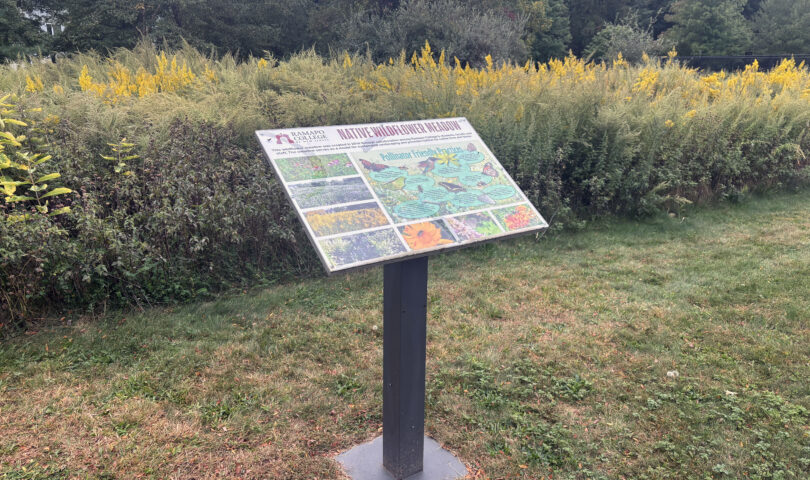Campus honey sales might be temporarily halted due to Ramapo’s bear population this semester as the Ramapo College Beekeeping Club is only working with one hive. Over the summer, one of the club’s hives was lost to a bear on the far edge of campus.
“It actually happened twice,” said Dr. Natalie Lemanski, an assistant professor of biology at Ramapo and faculty mentor of the Ramapo’s beekeeping club. She went on to explain that one of Ramapo’s beloved bears — who we all get emails about when they visit campus — had knocked down both of the beehives on the far end of campus.
“One of them was completely destroyed, unfortunately … the other we reassembled the hive that had been knocked down,” said Lemanski. “Generally, as long as the Queen and enough workers are still there, the hive, the colony can potentially survive.”
After the first incident, the one remaining beehive was reassembled, only for a bear to raid its honey a second time.
“The Queen was still alive … but the bear had basically eaten all the honey,” said Lemanski.
With the beekeeping clubs one remaining hive under threat, Lemanski and Ramapo facilities are working together to come up with a safe and sustainable solution to the hive’s bear problem.
“We’re hoping that maybe if we put it somewhere with a bigger fence, then that might be enough to keep the bear out,” said Lemanski, who has been talking with the director of facilities, Alan Kashian, about the hives options. “It’s not a guarantee, but I’m hoping that we are able to find a solution.”
Some other potential solutions that have been brainstormed include moving the beehives to an area that is already fenced, constructing an electric fence around the wildflower meadow or moving the clubs’ remaining hive to the G-wing balcony Lemanski keeps her personal beehives on.
“I think that there may be some safety concerns about that,” said Lemanski about moving the beekeeping club’s hives to the G-wing balcony where students would be working high-up and unattended.
With the welfare of the beekeeping club’s remaining hive being uncertain, Lemanski assures that she is dedicated to making sure the beekeeping club stays functioning this semester and far into the future.
“It’s just a question of when and which solution we really settle on, because I think they all have their tradeoffs,” said Lemanski.
Lemanski is very supportive of the hands-on educational activities the student-led beekeeping club provides.
“I think that by getting to know the bees and learning about them and sort of demystifying them, [through the club], I think … it spreads awareness of pollinators more broadly,” said Lemanski.
The beehives are housed behind the Sharp Sustainability Education Center, in the native wildflower meadow on campus. Fortunately, after two attacks, the one remaining hive is still surviving.
“I’m sure we’ll figure something out. The beekeeping club has been around for a long time. I’m very committed to making sure it can keep going,” said Lemanski.
jhammer@ramapo.edu
Featured photo by Jessica Hammer, Ramapo News






